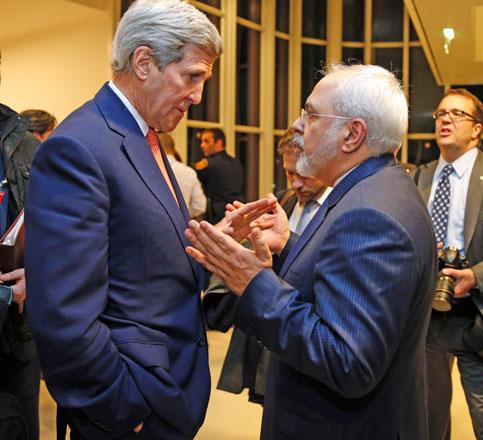You are here
US, Iran leaders hail nuke deal but US imposes new sanctions
By AFP - Jan 17,2016 - Last updated at Jan 17,2016

US Secretary of State John Kerry speaks with Iranian Foreign Minister Mohammad Javad Zarif after the International Atomic Energy Agency verified that Iran has met all conditions under the nuclear deal during the E3/EU+3 and Iran talks in Vienna on Sunday (AFP photo)
TEHRAN — The US and Iranian presidents on Sunday hailed the implementation of Tehran's nuclear deal as historic, but new American sanctions threatened fresh tensions.
The UN's atomic watchdog confirmed in Vienna late on Saturday that Iran had complied with its obligations under last summer's accord, leading the United States and the European Union to lift sanctions.
Iran's President Hassan Rouhani, a moderate whose 2013 election victory helped launch a huge diplomatic effort towards the deal struck on July 14 in Vienna, said the implementation was a crucial moment for his country.
"We Iranians have reached out to the world... have opened a new chapter in the relations of Iran with the world," the official IRNA news agency quoted him as saying.
In Washington, President Barack Obama said engagement with Iran had provided a "unique opportunity".
But Obama also noted that "profound differences" with Tehran remained over its "destabilising activities".
In a sign of those differences, Washington announced it had decided to target the Islamic republic's ballistic missile programme with new measures.
Five Iranian nationals and a network of companies based in the United Arab Emirates and China were added to an American blacklist, the US Treasury Department announced.
The White House had threatened to impose the measures last month but withdrew them after Rouhani hit out at both their timing and intent. Missiles were not part of the nuclear agreement.
Asked before the new sanctions were announced how Iran would react to fresh measures against it, Rouhani on Sunday had said: "Any action will be met by a reaction."
Released Americans leave Tehran
The new sanctions came after four Iranian-Americans, including The Washington Post reporter Jason Rezaian, left Tehran following their release in a prisoner swap with the United States.
The prisoner swap involved Rezaian, Christian pastor Saeed Abedini, former US Marine Amir Hekmati and a fourth man, Nosratollah Khosravi-Roodsari.
Iranian state television said they departed on a special plane to Bern in Switzerland but US officials told American media that Khosravi-Roodsari was not on board.
The Swiss foreign ministry confirmed that three US prisoners released by Tehran were due in the country.
The Washington Post publisher Frederick Ryan said in a statement: “We are relieved that this 545-day nightmare for Jason and his family is finally over.”
Under the exchange, Washington said it had granted clemency to seven Iranians, six of whom were dual US-Iranian citizens and dropped charges against 14 more.
Obama welcomed the Americans’ release, saying: “When Americans are freed, that’s something we can all celebrate.”
For a decade the sanctions, imposed in condemnation of Iran’s disputed nuclear programme, had crippled the country’s economy.
Rouhani, who has promised that 2016 will be a “year of prosperity” for Iranians, told lawmakers on Sunday that following the lifting of sanctions Iran would seek foreign investment of $30-$50 billion annually, to dramatically spur growth to 8 per cent.
Iran can now increase its oil exports, long the lifeblood of its economy though Rouhani has moved away from relying on crude. The nuclear deal will also open up business in the 79-million-strong country.
US Secretary of State John Kerry said Sunday that the United States was to repay Iran a $400 million debt and $1.3 billion in interest dating to the Islamic revolution.
Israeli warning
The repayment, arranged after an international legal tribunal, is separate from the tens of billions of dollars that Iran can now access after the end of nuclear sanctions.
The Vienna agreement was nailed down after two years of rollercoaster negotiations following Rouhani’s election.
It drew a line under a standoff dating back to 2002 marked by failed diplomatic initiatives, ever-tighter sanctions, defiant nuclear expansion by Iran and threats of military action.
International Atomic Energy Agency chief, Yukiya Amano, was also due in Tehran on Sunday for talks on the UN watchdog’s enhanced inspections to ensure Iran’s continued compliance with the deal.
The steps taken so far by Tehran extend to at least a year — from a few months previously — how long Iran would need to make one nuclear bomb’s worth of fissile material.
They include slashing by two-thirds its uranium centrifuges, reducing its stockpile of uranium — enough before the deal for several bombs — and removing the core of the Arak reactor which could have given Iran weapons-grade plutonium.
Iran has always denied wanting nuclear weapons, saying its activities are exclusively for peaceful purposes including power generation and medical research.
Critics, including Obama’s Republican opponents, have poured scorn on the deal, saying it fails to do enough to ensure Iran will never acquire the bomb.
Israel, widely assumed to be the Middle East’s only nuclear-armed state and Iran’s arch-foe, has repeatedly slammed the agreement.
Prime Minister Benjamin Netanyahu said Iran had not given up its hope of obtaining a nuclear weapon.
“Israel’s policy has been and will remain exactly what has been followed: to not allow Iran to acquire nuclear weapons,” Netanyahu told Cabinet on Sunday.
Related Articles
GENEVA — A Swiss plane carrying three of the four US citizens freed by Iran in a prisoner swap landed in Geneva on Sunday, a US official sai
TEHRAN — Iran denounced new US sanctions on its missile programme on Monday but pushed ahead with international cooperation after its histor
DUBAI — An Iranian court has sentenced The Washington Post reporter Jason Rezaian to a prison term, the state news agency said on Sunday quo
















